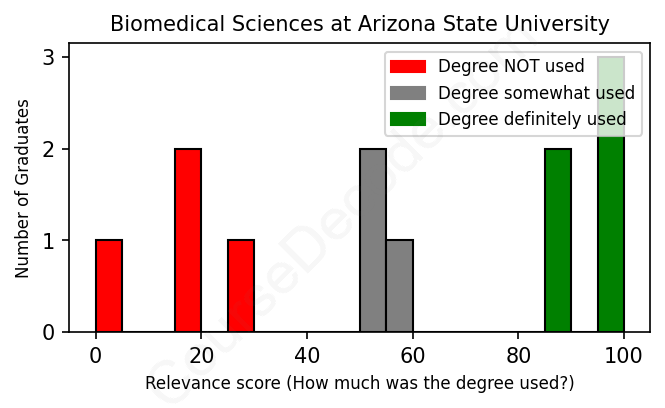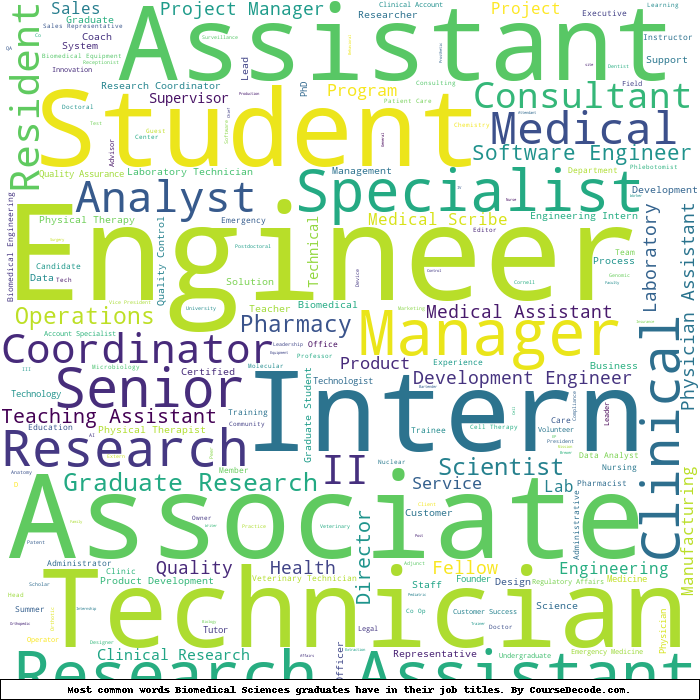
First, some facts. Of the Biomedical Sciences graduates from Arizona State University we've analyzed , here's how many have used (or NOT used) their degree in their career:

These are estimates based on AI analysis of 12 LinkedIn profiles (see below).
The verdict? Below average. Overall, with an average relevance score of 58%, Biomedical Sciences graduates from Arizona State University have a lower likelihood (-9%) of finding work in this field compared to the average graduate across all fields:
And for comparison, here's the chart for all profiles we've looked at across all degrees.
Also, after graduating, 50% of these graduates have pursued further education other than another Bachelor's degree (such as a Masters degree or other), compared to the average across all profiles of 35%. This suggests you may need more than just a Bachelors degree to be competitive as a Biomedical Sciences graduate.
See the details:
|
Relevance score: 27% We think this person has NOT gone into a career related to their degree. We think this person has NOT gone into a career related to their degree.
DEGREE INFOGraduated in 2016 from Arizona State University with a Bachelor of Science in Engineering (B.S.E.) in Biomedical Sciences. Also pursued further education since (see below). JOB HISTORY SINCE GRADUATIONQuality Engineering & Assurance Analyst at Client AbbVie Cognizant Aug 2016 - Jan 2017 Quality Engineering & Assurance Instruction Designer at Client AbbVie  Cognizant Jan 2017 - Jan 2018 Senior Business Analyst- Automation & Robotics  Aetna, a CVS Health Company Jan 2018 - Aug 2018 Business Consultant- Automation & Robotics  Aetna, a CVS Health Company Aug 2018 - Jan 2021 Solution Specialist in Strategy & Analytics, AI & Data Offering  Deloitte Jan 2021 - Present FURTHER DEGREES DONE SINCE GRADUATINGMaster of Business Administration - MBAGrand Canyon University 2020 - 2022 ABOUTI am a seasoned Solution Specialist with 8+ years of experience in AI & Data Operations, specializing in pioneering transformative automation solutions across Enterprise and Government sectors. At Deloitte Consulting LLP, I lead and/or support strategic initiatives leveraging Robotic Process Automation (RPA), Intelligent Optical Character Recognition (IOCR), and advanced data analytics to optimize operations and enhance decision-making. My expertise with industry-leading tools such as Automation Anywhere, Alteryx, UiPath, Tableau, and AWS has enabled me to develop robust automation protocols integrated with data preparation and enterprise analytics platforms.In my role as the Government and Public Sector (GPS) Tableau Alliance Subject Matter Expert Lead at Deloitte, I support business development, lead certification trainings, and contribute to client proposal initiatives. This role underscores my commitment to driving organizational growth and excellence in technical mastery.My extensive background in Quality Engineering fosters a deep commitment to enhancing data quality, data security, and process management. This is further supported by my involvement in cutting-edge projects utilizing Natural Language Toolkit (NLTK), Language Learning Models (LLM), AWS Lambda for serverless computing, and integrations of General AI technologies, positioning me at the forefront of AI-driven business solutions.Previously, I served as a Business Consultant at CVS Health-Aetna, a Fortune 4 company, where I implemented finance transformation initiatives through automation and RPA, leading to substantial efficiency gains. My tenure at Cognizant Technology Solutions involved managing complex software development lifecycle projects, enhancing my expertise in project management and technical lead roles.Holding an MBA from Grand Canyon University and a BSE in Biomedical Engineering from Arizona State University, I bring a comprehensive blend of education and practical experience. My skills extend to functional requirements gathering, data preparation, dashboard design, governance compliance, data visualization, and test execution in validation and UAT environments.I am driven by a passion for leveraging cloud technologies, AI, and innovative automation to drive digital transformation and enhance operational outcomes in healthcare, government, and financial sectors. Connect with me to explore how my diverse skill set and visionary approach can drive your organizations innovation and strategic initiatives. |
The top 10 most common jobs done by the graduates we've analyzed (ranked most common to least) are:
When looking at jobs that people with a Biomedical Sciences degree from Arizona State University have landed, there's a pretty mixed bag. A lot of graduates have found themselves in roles like Technical Services Engineer, Quality Engineering Analyst, and Business Consultant, where the connection to biomedical sciences isn’t super strong. These roles often call for problem-solving and analytical skills, which are valuable in sciences, but they don't necessarily revolve around the core knowledge from a biomed degree. This is especially true for jobs in automation and robotics, which seem to dominate the field. While these positions leverage some general skills, they don’t directly apply the specialized biomedical knowledge that comes from the degree.
On the flip side, there are some standout positions that align well with the Biomedical Sciences background. Positions like Senior Scientist at Boston Scientific, Research and Development Engineer at various health-tech firms, and roles in clinical study management show a clear connection to the field. These jobs not only utilize the knowledge gained during their degree but also underscore the importance of biomedical sciences in research and biotech development. So, while many graduates may be charting their paths in less directly related fields, there are definitely those who are putting their biomedical education to great use in specialized roles as well!
Here is a visual representation of the most common words in job titles for Biomedical Sciences graduates (this is across all Biomedical Sciences graduates we've analyzed, not just those who went to Arizona State University):

When looking at the career trajectories of people who graduated from Arizona State University with a degree in Biomedical Sciences, it seems like they've mostly found their way into relevant and interesting careers. Right after graduation, many of them started in roles that are closely tied to healthcare and engineering, like clinical conduct positions and engineering roles in medical companies. For instance, graduates from 2016 are already working in senior positions at reputable companies like Boston Scientific and Deloitte, which shows a solid upward trajectory in their careers. Even those who started out in quality assurance and consulting roles seem to have transitioned into more specialized healthcare positions over time.
Fast forward five or ten years later, it looks like the pattern continues, with many folks advancing to higher roles. For example, some graduates have moved from entry-level jobs like phlebotomists to managerial roles in clinical environments. Others have started their own practices, like a dental office, suggesting that the degree provides a strong foundation for entrepreneurship in the healthcare field. There are a few outliers, like those who may have ventured into unrelated fields or lower-skill jobs, but overall, it looks like most graduates are leveraging their Biomedical Sciences degree quite effectively in careers that align with their studies. So, if you're considering this degree, it seems like a pretty promising path to follow!
You know, a Bachelor’s degree in Biomedical Sciences can be pretty challenging, especially at a school like Arizona State University, which has a solid reputation. The coursework usually involves a good mix of biology, chemistry, and even some physics, so if you’re not super into those subjects, you might find it a bit tough. Plus, you're often juggling lab work and projects on top of lectures. It's definitely more intense than your average degree, but if you’ve got a passion for the sciences and are willing to put in the effort, it can be really rewarding. Just be ready to study hard and manage your time well!
Most commonly, in the LinkedIn profiles we've looked at, it takes people 4 years to finish a Bachelor degree in Biomedical Sciences.
Looking at these graduates from Arizona State University, it seems like many of them have landed pretty decent jobs, especially considering the fields they're in. For example, those working in engineering and consulting roles at companies like Deloitte and Boston Scientific are likely making solid salaries, likely well into the mid to high five figures, if not six figures. Meanwhile, those in healthcare roles, like the dental owner and clinical positions, can also find lucrative opportunities, especially as they gain experience. There are a few outliers, like the phlebotomists, who might not be pulling in as much right away, but overall, it looks like these grads are on a good financial path. So, yeah, it seems like a decent return on their investment in their education!
Here is a visual representation of the most common words seen in the "about" section of LinkedIn profiles who have a Bachelor degree in Biomedical Sciences (this is across all Biomedical Sciences graduates we've analyzed, not just those who went to Arizona State University). This may or may not be useful:

Here are all colleges offering a Bachelor degree in Biomedical Sciences (ordered by the average relevance score of their Biomedical Sciences graduates, best to worst) where we have analyzed at least 10 of their graduates:
| College | Score | Count |
|---|---|---|
 Western Michigan University Western Michigan University
|
81 | 17 |
 Marquette University Marquette University
|
78 | 29 |
 University of Michigan University of Michigan
|
77 | 10 |
 Colorado State University Colorado State University
|
77 | 19 |
 University at Buffalo University at Buffalo
|
75 | 18 |
 California Polytechnic State University-San Luis Obispo California Polytechnic State University-San Luis Obispo
|
74 | 13 |
 University of Connecticut University of Connecticut
|
74 | 15 |
 Texas A&M University Texas A&M University
|
73 | 59 |
 Auburn University Auburn University
|
71 | 26 |
 Northern Arizona University Northern Arizona University
|
71 | 15 |
 Rensselaer Polytechnic Institute Rensselaer Polytechnic Institute
|
70 | 10 |
 University of Central Florida University of Central Florida
|
69 | 26 |
 University of South Florida University of South Florida
|
68 | 48 |
 Georgia Institute of Technology Georgia Institute of Technology
|
67 | 41 |
 The Ohio State University The Ohio State University
|
64 | 14 |
 Rochester Institute of Technology Rochester Institute of Technology
|
64 | 12 |
 Case Western Reserve University Case Western Reserve University
|
63 | 12 |
 Grand Valley State University Grand Valley State University
|
59 | 35 |
 Arizona State University Arizona State University
|
58 | 12 |